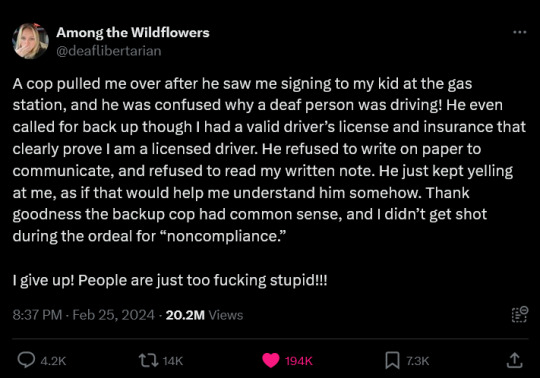#social communication
Text
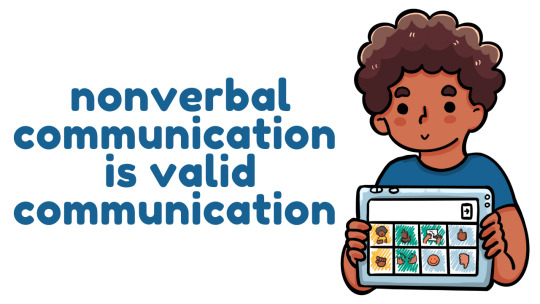
nonverbal communication is valid communication
#our edits#nonverbal#semiverbal#aac#aac user#tts#tts user#aac tts#tts aac#nonspeaking#semispeaking#social communication#commuication#nonverbal communication#autism#autistic#asd#actually autism#actually autistic#autism spectrum disorder#autie#actually autie#actually neurodiverse#actually neurodivergent#nuerodiversity#neurodivergent#neurodiverse
3K notes
·
View notes
Text
i text anyone anything an in the time between me sending it and them replying, i just fill up with self hatred from all the social anxiety. but then they text back and i’m all good again. 🌹🌹
7 notes
·
View notes
Text
Asking questions while a person is not paying attention to you.
I have noticed that sometimes person 1 asks a question for person 2 to answer, but person 2 is not paying attention. This results in person 2 not hearing the full question and either giving an answer based on the parts that they heard or asking for the whole question again.
For me personally, I always ask for the full question again because I want to make sure I am saying the right answer to the right question.
I sometimes want to ask a question to a person, but I don't know how to get the attention of the person.
Recently, I have discovered that one way to get the attention of a person is by starting a conversation with them. An easy way to start a conversation is saying "hi". You can then wait for the person to respond with something and say your question after their response.
You can also start a conversation with actions such as going near a person and staring at them. If they notice you, they may think that you are waiting to say something to them and start paying attention to you. They may look at you or say something like "what do you want to say to me?" to show that they are paying attention.
With this information that I have discovered, I have found out that my mistake was not starting a conversation before asking a question.
You can still ask a question without starting a conversation, but there is a possibility that the person will not be paying attention.
#tevvyline#idea#ideas#thought#thoughts#social idea#social ideas#social thought#social thoughts#thinking#support#social support#social communication#socialising#social skills#social#social difficulties#social difficulty#social interaction#communication difficulty#communication difficulties#communication
2 notes
·
View notes
Text
Blog #8
Another social media app?? Another way to connect!!
I have found that maintaining relationships on social media, is now the new normal. If there was one specific social media app that I find the most useful when trying to get closer to someone, it is Snapchat.
It starts off with just a normal "mass snap" that is sent to everyone, and then you just sneak in that one old friend you've been trying to reconnect with for quite some time. Now, they may not always respond, but if they do, then there's your chance at redemption.
I had a falling out with a friend a couple years back, and we didn't speak for months. Neither one of us had reached out to one another, until one day I took what I thought, was a hilarious Snapchat and sent it to all my close friends, and I added the friend I had a falling out with on that list of people who were going to receive my Snap. That one Snapchat started a 20+ day streak of just catching up and sharing the events that happened throughout our days. We have been friends ever since.
I feel as if people in my generation grew up around so many social media websites and apps, we almost forget that social media is not the only way of reaching out. While it is helpful, it should not be our only way of communicating and maintaining friendships, but it sure has been useful in the past.
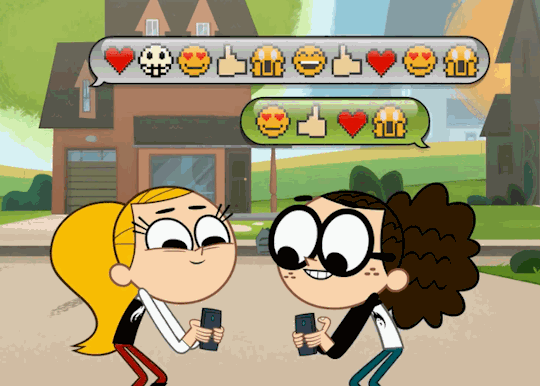
2 notes
·
View notes
Text
Not socialist in a “I won’t have to work” type of way but socialist in a “I’ll still be working but I won’t be worried I won’t make the rent” type of way. In a “billions won’t be hoarded by one person” type of way. In a “janitors, fast-food workers, child care workers, preschool teachers, hotel clerks, personal care and home health aides, and grocery store cashiers, will live comfortably” type of way. In a “the sick and elderly will be cared for” type of way. In a “no child should work” type of way.
#socialist#socialism#communism#anti capitalism#the belief that we won’t work under capitalism genuinely makes me so mad#like#you realize the goal of social reform is to abolish imperialism right?#there won’t be good just showing up out of nowhere without slavery and/or imperialism
86K notes
·
View notes
Text
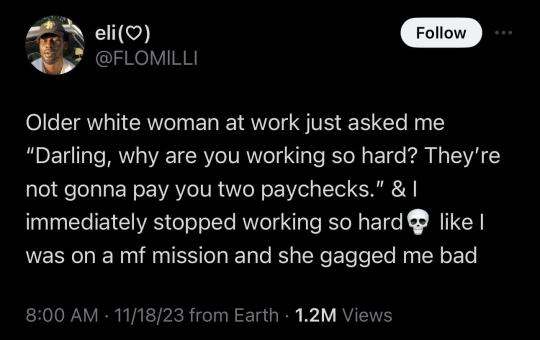
#leftism#anti capitalism#socialism#communism#anarchy#capitalism#eat the rich#twitter x#late stage capitalism#leftist#anarchism
92K notes
·
View notes
Text
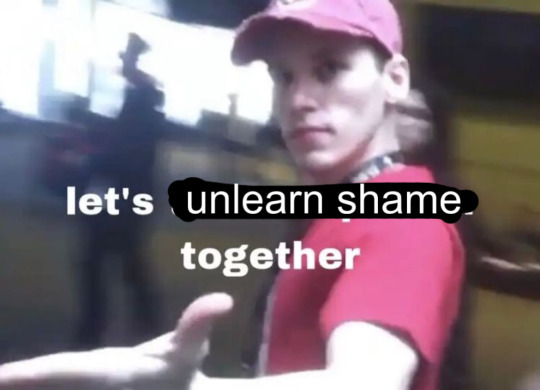
#i’ve been thinking abt that cringe post#i think the latent feelings behind ‘cringe’ are shame and sometimes envy/bitterness#same vibes as when six year olds say ‘those toys are for babies’ if they’ve been shamed for their age by older kids#anyway. i think part of the healing process is realizing that shame puts you at war with yourself bc part of yourself is a social being!#and that part of you wants community and acceptance (maybe love). shame is the absence of acceptance#unlearning shame means learning self-love and gaining the confidence to find your people#jerma#cw jerma#(someone asked me to tag lol)
54K notes
·
View notes
Text

22K notes
·
View notes
Text
I have found the best ally
Straight and cis people will say that they are allies, but you will NEVER measure up to my dentist.
Me: "Hey, is it ok if I can change my name on my info from [DEADNAME] to Sai?"
Random woman that I wasn't even talking to in the chair next to me: "Honey, if that's the name you had at birth, [DEADNAME] is your only name."
My dentist, very slowly turning her rolley chair towards the woman: "Shush."
Random woman: "Excuse me?"
Destist: *closes privacy curtain while staring bullets at the lady*
Me: *pissing myself laughing*
My dentist while changing my name in my info (reminder that English is not her first language, she immigrated from Russia): "There, Sai, you have pretty boy teeth. Smile and make all girls swoon."
Me not having the heart to tell her I'm not transmasc but I'm Agender, and still pissing myself laughing: "Thank you [DENTIST NAME]."
#trans pride#queer#nonbinary#lgbtqia#queer pride#queer community#lgbtq#lgbtq community#queer joy#queer jokes#queer journey#fuck transphobes#transgender#anti capitalism#anti zionisim#anti trans violence#trans ally#lbgtqia#gender is a social construct#Why are all Russians such good allies I stfg
32K notes
·
View notes
Text
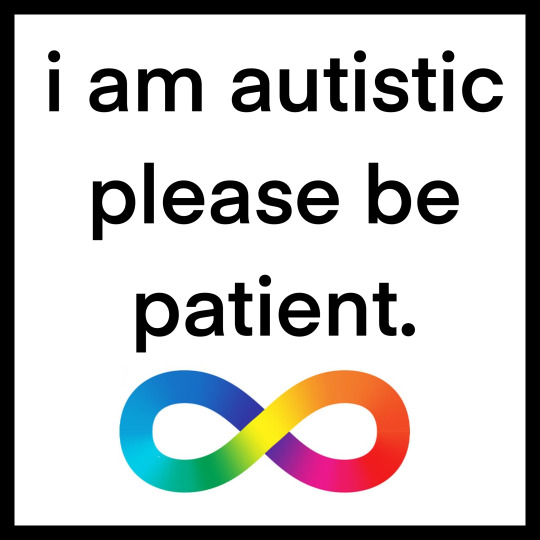
i am autistic please be patient
communication card
#blurry art#our communication cards#communication cards#social communication#commuication#nonverbal communication#autism#autistic#asd#actually autism#actually autistic#autism spectrum disorder#autie
475 notes
·
View notes
Text
forcing yourself to speak
some people respond to the idea that people with sm can force themselves to speak, by reinforcing the fact that sm is defined as the ‘inability’ to speak. i get why they argue this, because there could, and already are, negative consequences from the idea that people with sm can be forced to speak. namely that they can be subjected to enormous pressure to ‘push through it’ and this just worsens their anxiety.
but i think there’s an important difference between forcing yourself to speak and being forced to speak. the former is a choice freely made, while the latter is the product of coercion and an effort to keep yourself safe from humiliation.
when i say the former is a choice freely made i don’t mean that everyone with sm can make this choice if they try enough; sm is by nature the inability to speak/communicate no matter how hard you try. although i think that sometimes ‘forcing yourself to speak’ is just a different response to the same anxiety, just based on a differing perception about what will keep you safe and best avoid humiliation.
i also don’t think the question should be ‘does it count as sm if i can force myself to speak?’ because sm is more complicated than that. i would say that when people with sm ‘force ourselves to speak’…
we aren’t really speaking.
this is the garbled sounds that aren’t words, the voice so quiet it’s barely audible, the monotone voice, the single word, the mmmhhmm, the reading from a script (such as reading out a pre-written or pre-suggested response, or reading from a text), the words you can barely get through because anxiety clogs your throat and tenses your body.
i think the idea that because someone with sm can force themselves to speak they are somehow choosing not to, doesn’t take into account the struggles they have with communicating. again this stems from the focus on what is a problem for OTHER people, as though as soon as a person can speak in a situation they previously couldn’t, their sm is cured: the anxiety is still there and still hurting them.
i can’t think of any situations where i’ve been able to force myself to speak. i can think of situations where i’ve surprised myself that i’ve been able to speak. but i can also think of situations where i’ve desperately needed to speak and couldn’t, and i think it’s those times, rather than the times where i’ve been sort-of able to speak in a quiet or garbled voice, that define sm.
it is not a black-and-white division between completely-silent and fully able to speak; it affects all communication to varying degrees and ‘situations’ are not ‘settings’ or ‘states’ that a person is in; the level of anxiety correlates with the ability to communicate and with sm this just means that there is one or more significant situations in which they persistently struggle to communicate. i would equate this with an ‘inability’ just as the diagnostic criteria does, i wouldn’t worry too much about how far speaking is ‘impossible’ because such concerns are ableist when they equate what you can do when forced or when putting yourself in an extreme state of anxiety, with what you can and should do. 🌹🌹
#idk just my opinion dont hurt me#situational mutism#selective mutism#selectively mute#social communication#mentalheathawareness#actually mentally ill#actually socially anxious#mental health awareness#ableist bullshit#ableism tw
5 notes
·
View notes
Text
You can sometimes ask someone a question while (1) knowing the answer to it or (2) knowing what the person's response will be to that question. For example, person 1 notices that person 2 is sad and asks person 2 "how are you feeling?" (1). Person 2 may respond with "I don't know" or "I'm sad" to that question. Person 1 may be already prepared for these responses and know what to say next (2).
You can tell the correct answer to the person if you have (1). This is only used for certain types of questions. For example, when a teacher asks the class a fact question and if the class can not answer this question or the class answers with the incorrect answer, the teacher can tell the correct answer to the fact question.
You shouldn't tell the correct answer to the "how are you feeling?" question because that will be rude.
You can also tell the person what their response will be if you have (2), but that will be rude.
Situation possibilities:
[1 + 2]
[only 1]
[only 2]
#tevvyline#idea#ideas#thought#thoughts#social idea#social ideas#social thought#social thoughts#thinking#support#social support#social#social communication#social difficulties#social difficulty#social interaction#social skills#communication#communication difficulties#communication difficulty
2 notes
·
View notes
Text
The nazis that you see in movies are as much a historical fantasy as vikings with horned helmets and samurai cutting people in half.
The nazis were not some vague evil that wanted to hurt people for the sake of hurting them. They had specific goals which furthered a far right agenda, and they wanted to do harm to very specific groups, (largely slavs, jews, Romani, queer people, communists/leftists, and disabled people.)
The nazis didn't use soldiers in creepy gas masks as their main imagery that they sold to the german people, they used blond haired blue eyed families. Nor did they stand up on podiums saying that would wage an endless and brutal war, they gave speeches about protecting white Christian society from degenerates just like how conservatives do today.
Nazis weren't atheists or pagans. They were deeply Christian and Christianity was part of their ideology just like it is for modern conservatives. They spoke at lengths about defending their Christian nation from godless leftism. The ones who hated the catholic church hated it for protestant reasons. Nazi occultism was fringe within the party and never expected to become mainstream, and those occultists were still Christian, none of them ever claimed to be Satanists or Asatru.
Nazis were also not queer or disabled. They killed those groups, before they had a chance to kill almost anyone else actually. Despite the amount of disabled nazis or queer/queer coded nazis you'll see in movies and on TV, in reality they were very cishet and very able bodied. There was one high ranking nazi early on who was gay and the other nazis killed him for that. Saying the nazis were gay or disabled makes about as much sense as saying they were Jewish.
The nazis weren't mentally ill. As previously mentioned they hated disabled people, and this unquestionably included anyone neurodivergent. When the surviving nazi war criminals were given psychological tests after the war, they were shown to be some of the most neurotypical people out there.
The nazis weren't socialists. Full stop. They hated socialists. They got elected on hating socialists. They killed socialists. Hating all forms of lefitsm was a big part of their ideology, and especially a big part of how they sold themselves.
The nazis were not the supervillians you see on screen, not because they didn't do horrible things in real life, they most certainly did, but because they weren't that vague apolitical evil that exists for white American action heros to fight. They did horrible things because they had a right wing authoritarian political ideology, an ideology that is fundamentally the same as what most of the modern right wing believes.
#196#my thougts#leftist#leftism#jewish#jumblr#actually mentally ill#mental illness#neurodivergent#actually neurodivergent#world war 2#world war ii#history#queer#gay#queer history#pagan#athiest#athiesm#disability rights#communist#communism#socialist#socialism#anti conservative#anti christianity#christanity#christianity#mad pride#madpunk
10K notes
·
View notes
Text
I'm up to the "I dunno maybe children working 13 hour shifts is bad, guys" part of Capital and it feels important to inform people that haven't read it yet that capitalists in the 19th century were not by any means wringing their hands and twirling their mustaches about employing children to squeeze out profits, they were hiring "experts" to write newspaper articles for them, explaining how "well, the socialists have these big demands about an 8-hour work day, and taking Saturdays off, but it's actually just so complicated, it's too complicated for most people to understand, we just NEED to hire children for night shifts because the stamina of their strong, youthful bodies is the only way we can survive as a business! It's science, you see. Economics doesn't work like that, just ask our economics professors at Oxford. You CAN'T turn a profit only working people 8 hours! Trust the experts, they know. It's just so complicated..."
That exact infuriating cadence that you read in New York Times articles, in the Atlantic Monthly, in the WaPo and all the other bourgeois rags where "everything is so complicated, and it's actually a lot more complicated than you think.." that has been around since the beginning. It is nothing new. So the next time you see some op-ed from Matt Yglesias or any of those other guys huffing their own farts about how "complicated" everything is, and how "unrealistic" a 30-hour work week is, remember that Marx was dealing with that exact class of "intellectuals" "explaining" how working 13 hours at age 10 was "vital" to the "moral fibre" of those poor kids.
38K notes
·
View notes
Text
to me, the funniest thing about “that’s rough buddy” isn’t the fact that sokka says something patently insane with zero context seemingly out of nowhere, or the fact that zuko clearly doesn’t know how to respond. it’s the completely incorrect use of the word “buddy.” zuko would obviously like to be friends with sokka, but sokka is not, in fact, his friend. this is the most time they’ve ever spent together, and it’s because zuko invited himself to tag along on sokka’s suicide mission. at this point in the episode, sokka still hates this guy, perhaps less than he did a week ago, but he still hates him enough that he didn’t bother forcing zuko to stay home, which means he still didn’t really care whether or not zuko lives or dies. which, considering that he had tried to kill zuko multiple times in the past, is not all that surprising. this entire episode is essentially just zuko forcing his friendship onto sokka while sokka is legitimately too depressed to care. so when zuko calls sokka “buddy,” there’s a spirit of dogged optimism characterizing that epithet, because in no possible realm would sokka consider zuko his buddy at this point in the episode. and that’s something we miss when noting the iconicness of this exchange, simply because, by the end of this episode, they are buddies, so in our minds looking back on these lines, the implication of friendship doesn’t feel out of place at all. and really, it isn’t out of place, but only because zuko’s tenacity and determination (in this instance, his determination to befriend sokka) has always hugely outweighed his ability to read the room.
#and not for nothing but i think if anyone called zuko buddy (such as aang for example) he would melodramatically groan or something#by all accounts this is not a word he would ever use#but this is his first time even mildly successful socializing with a guy his age#and hes like ‘this is how males communicate right?’#‘if i call him buddy it shall establish camaraderie. which is the first step to marriage’#zuko#sokka#sokkaxzuko#90% of my zukka posts are about how sokka hates zuko and wants to kill him#but i think that’s an important contribution to the zukka ecosystem . perhaps even the most important
13K notes
·
View notes
